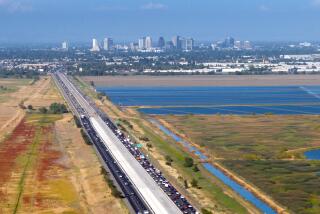Senate Panel Favors Mass Transit : Legislation: It approves a $105-billion transportation bill that earmarks less money for highways than a White House proposal.
- Share via
WASHINGTON — A Senate committee on Wednesday approved a five-year, $105-billion transportation bill that would earmark less money for highways and allow more spending on mass transit than a competing White House proposal.
The Senate Committee on Environment and Public Works voted, 15 to 1, to approve the bill after rejecting efforts to incorporate some elements of the Bush Administration plan and to alter the formula for parceling out aid for roads, bridges, bus systems and rail lines.
The Surface Transportation Efficiency Act of 1991, authored chiefly by Sen. Daniel Patrick Moynihan (D-N.Y.), would grant states unprecedented authority to decide whether to spend billions of dollars in federal assistance on highways or mass transit systems. Current federal programs strictly earmark federal aid for interstate, highway, bridge, or transit spending, with the lion’s share going for highways.
The Administration’s transportation proposal, unveiled in February, would create a 150,000-mile National Highway System that would include the existing interstate highways and earmark nearly two-thirds of all federal highway aid for the new system. Another program would serve secondary roads in urban and rural areas.
Altogether, the Administration plan would increase annual highway spending by 27% over the next five years, from $16.2 billion in fiscal 1992 to $20.6 billion in fiscal 1996. But spending on transit systems would remain virtually flat, increasing from $2.9 to $3.2 billion.
The Senate plan calls for the same amount of overall spending as the Bush proposal--$105 billion over five years. But it would funnel half of all federal transportation aid--some $52.5 billion--into a “surface transportation program” that could be used for either roads or mass transit projects, with the decision left up to the states. Other funds would be earmarked for bridge programs and completion of the two remaining segments of the interstate highway systems in Los Angeles and Boston.
The Senate bill would provide an 80% federal matching share for most transportation programs, except new construction, while the Administration would offer a matching share of 60% for most of its major programs.
The Senate measure, scheduled for full Senate consideration the week of June 10, could lead to a confrontation with the Administration. Secretary of Transportation Samuel K. Skinner has said that he may recommend a veto if the bill fails to provide for a national highway system.
Congress is expected this year to enact a comprehensive transportation bill that would revamp the program, created in 1956, that financed construction of the 42,000-mile interstate highway system, which is all but complete.
“Sen. Moynihan has quite wisely referred to this as a once-in-a-half-century opportunity,” said Sen. Joseph I. Lieberman (D-Conn.) “It will have a lot to do with how America will look and how Americans will live for years to come.”
The committee rejected an attempt by Sen. Bob Graham (D-Fla.) to include a national highway system in the Senate bill and to change the way the legislation would distribute federal aid money to the states.
Graham and other senators said that they want to increase the return of federal dollars to heavily populated “donor” states that traditionally contribute more to the federal highway trust fund, through federal gasoline taxes, than they get back in transportation aid.
California, for example, contributed about 11% of all federal gasoline tax revenues in the 1990 fiscal year, but it will get back only about 9.25% of the total.
Less populated but geographically large Western states benefit from the current system because it costs more to maintain their interstates and other federal highways than their own motorists contribute through gasoline taxes.
“Not every state is going to be happy with this bill--everyone wants more money,” cautioned Sen. John H. Chafee (R-R.I.), one of the measure’s principal sponsors. He said that the legislation “strikes a balance between donor states and those who get back more than they contribute.”
Sen. Howard M. Metzenbaum (D-Ohio) disagreed. “This is an issue that has to be dealt with,” Metzenbaum said. “This is an issue that will create a donnybrook on the floor of the Senate.”
In a conciliatory gesture, the panel adopted an amendment that would authorize the Department of Transportation and state officials to map out a proposed national highway system over the next two years. Unlike the Administration proposal, however, it does not set aside specific funding for the system.
Meanwhile, the committee adopted an amendment that would ban certain types of multiple tractor-trailer combinations from operating outside states that now permit them. The ban would apply to double 48-foot trailers, triple 28-foot trailers and “Rocky Mountain doubles”--one 48-foot trailer with a rear 28-foot trailer, all of which currently are banned in California.
More to Read
Get the L.A. Times Politics newsletter
Deeply reported insights into legislation, politics and policy from Sacramento, Washington and beyond. In your inbox twice per week.
You may occasionally receive promotional content from the Los Angeles Times.










